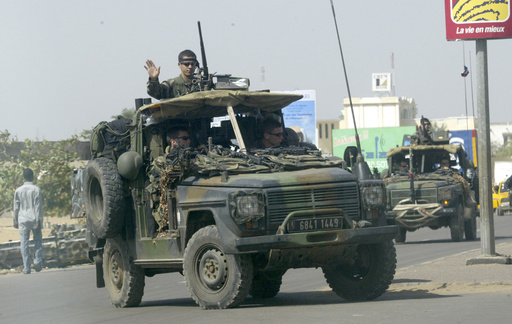DAKAR, Senegal — The past month has seen significant turmoil for France in its relationships with former African colonies, presenting the country with its greatest challenge in influence over the continent in several decades.
As Paris worked on a new military strategy that aims to drastically reduce its stationed troops in Africa, two key allies dealt a significant blow to France’s longstanding military ties. On its Independence Day, the government of Chad, a nation often regarded as France’s most reliable and stable partner in Africa, declared its intention to terminate defense cooperation, emphasizing the need to reassert its sovereignty.
Hours later, Senegal’s newly elected president, Bassirou Diomaye Faye, made remarks in an interview with Le Monde, indicating that French troops would soon no longer be present in Senegal, stating, “Just because the French have been here since the slavery period doesn’t mean it’s impossible to do otherwise.”
These developments occurred amid France’s attempts to regain its diminishing influence in the continent. Foreign Minister Jean-Noël Barrot was concluding visits to Chad and Ethiopia, while President Emmanuel Macron made headlines by acknowledging the deaths of nearly 400 West African soldiers at the hands of the French Army in 1944.
After Chad’s announcement, French officials remained silent for almost a day before responding, asserting that they were engaged in a “close dialogue” regarding the partnership’s future. Mucahid Durmaz, a senior analyst at Verisk Maplecroft, stated that Chad’s decision signals the end of France’s post-colonial military influence throughout the Sahel region, known for its arid landscape south of the Sahara.
Durmaz further noted that the decisions by Senegal and Chad reflect a broader transformation in the region’s relationship with France, where the political and military sway of Paris continues to wane. This shift is coupled with the removal of French military presence in recent years by governments in Niger, Mali, and Burkina Faso, which have seen public sentiment sour toward French forces following persistent battles against Islamic extremist insurgencies.
In response to these developments, Jean-Marie Bockel, an envoy for Africa appointed by Macron, recently submitted a report on the future of the French military presence in the region. Bockel’s report is a component of Macron’s “renewal of our partnership with African countries,” a strategy first outlined in a 2017 address in Burkina Faso during his early presidency.
Specific details of the report have not been disclosed, but unnamed French officials indicated that the plan involves significantly decreasing troop levels across most bases in Africa, except for the vital base located in Djibouti. They clarified that this move does not necessarily imply a reduction in military cooperation but should rather emphasize a response to the expressed needs of various nations, potentially focusing on specific areas such as drone training and airspace surveillance.
In addition, France recently established an African command similar to the U.S. military’s AFRICOM, with newly appointed commander Pascal Ianni specializing in influence and information warfare, in light of growing Russian presence in Africa. Will Brown, a senior policy fellow, emphasized that the traditional framework of permanent military bases may not be the most strategic approach, especially with rising political tensions and disinformation campaigns.
Moreover, France aims to strengthen its economic ties with English-speaking African nations like Nigeria, which now stand as its leading trading partners on the continent. Notably, Macron was in talks with Nigerian President Bola Tinubu when the announcement was made in Chad.
Since the independence of its former colonies, France has maintained a policy known as Françafrique, characterized by economic, political, and military influence and the retention of thousands of troops across the region. Currently, France maintains approximately 600 troops in Ivory Coast, 350 in Senegal, 350 in Gabon, and around 1,500 in Djibouti, alongside 1,000 troops stationed in Chad.
According to the French defense ministry, the mission of troops deployed in Africa includes training local forces and enhancing their capabilities to confront extremism through peacekeeping operations, intelligence, and logistics. However, critics argue that this military presence also enables France to exert influence and support governments that are favorable to its interests.
In light of growing anti-French sentiment, protests have erupted across various West and North African nations, driven by governments that have asserted that ties with France have not yielded benefits for the populace. These governments seek to explore different partnerships with emerging global powers, including Russia, China, and Turkey.
President Mahamat Deby from Chad is believed to have taken this significant step partly due to receiving security assurances from alternative foreign partners. Reports indicate support has been garnered from the United Arab Emirates, as they monitor developments in the tumultuous regions of Sudan and Darfur. Additionally, there’s insight into recent outreach from Turkey.
Chad shares borders with several nations where Russian military groups operate. Earlier this year, Deby visited Moscow to strengthen ties with this “partner country.” In similar circumstances, military leaders in Mali, Niger, and Burkina Faso who have also ousted French forces have been moving closer to Russia, which has deployed mercenaries accused of human rights violations across the Sahel.
Yet, the rise in violence in these countries suggests an alarming security downturn, with more extremist attacks and civilian casualties recorded. According to data, over 3,000 civilians were killed in the first half of this year, marking a 25% increase from previous months. While its unclear if the departure of French troops has led to this spike in violence, analysts have noted a significant “security vacuum” created by their withdrawal, indicating it is challenging to be filled by alternative forces such as those from Russia. Troops from the Russian private military contractor Wagner are being funded by local junta governments, which often face budgetary constraints.


